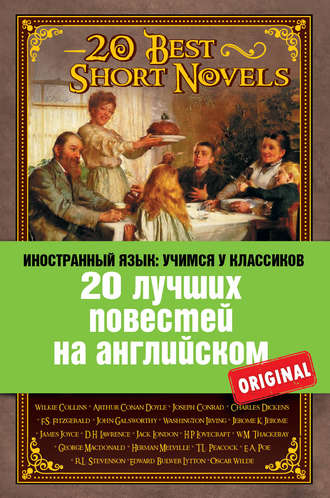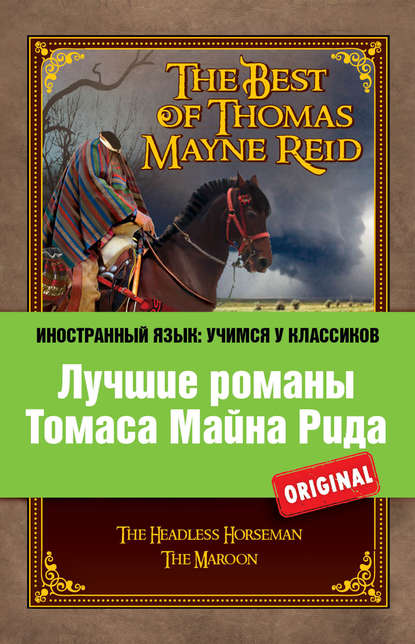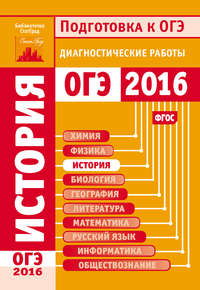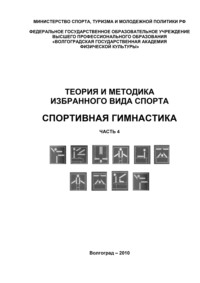
Полная версия
20 лучших повестей на английском / 20 Best Short Novels
The landlord turns himself sleepily round, and looks at the horses. ‘A fine pair of horses, them two in the yard. Do you want to put ‘em in my stables?’ I reply in the affirmative by a nod. The landlord, bent on making himself agreeable to my wife, addresses her once more. ‘I’m a-going to wake Francis Raven. He’s an Independent Methodist. He was forty-five year old last birthday. And he’s my hostler. That’s his story.’
Having issued this second edition of his interesting narrative, the landlord enters the stable. We follow him to see how he will wake Francis Raven, and what will happen upon that. The stable broom stands in a corner; the landlord takes it – advances toward the sleeping hostler – and coolly stirs the man up with a broom as if he was a wild beast in a cage. Francis Raven starts to his feet with a cry of terror – looks at us wildly, with a horrid glare of suspicion in his eyes – recovers himself the next moment – and suddenly changes into a decent, quiet, respectable serving-man.
‘I beg your pardon, ma’am. I beg your pardon, sir.’
The tone and manner in which he makes his apologies are both above his apparent station in life. I begin to catch the infection of Mrs. Fairbank’s interest in this man. We both follow him out into the yard to see what he will do with the horses. The manner in which he lifts the injured leg of the lame horse tells me at once that he understands his business. Quickly and quietly, he leads the animal into an empty stable; quickly and quietly, he gets a bucket of hot water, and puts the lame horse’s leg into it. ‘The warm water will reduce the swelling, sir. I will bandage the leg afterwards.’ All that he does is done intelligently; all that he says, he says to the purpose.
Nothing wild, nothing strange about him now. Is this the same man whom we heard talking in his sleep? – the same man who woke with that cry of terror and that horrid suspicion in his eyes? I determine to try him with one or two questions.
III
‘Not much to do here,’ I say to the hostler.
‘Very little to do, sir,’ the hostler replies.
‘Anybody staying in the house?’
‘The house is quite empty, sir.’
‘I thought you were all dead. I could make nobody hear me.’
‘The landlord is very deaf, sir, and the waiter is out on an errand.’
‘Yes; and you were fast asleep in the stable. Do you often take a nap in the daytime?’
The worn face of the hostler faintly flushes. His eyes look away from my eyes for the first time. Mrs. Fairbank furtively pinches my arm. Are we on the eve of a discovery at last? I repeat my question. The man has no civil alternative but to give me an answer. The answer is given in these words:
‘I was tired out, sir. You wouldn’t have found me asleep in the daytime but for that.’
‘Tired out, eh? You had been hard at work, I suppose?’
‘No, sir.’
‘What was it, then?’
He hesitates again, and answers unwillingly, ‘I was up all night.’
‘Up all night? Anything going on in the town?’
‘Nothing going on, sir.’
‘Anybody ill?’
‘Nobody ill, sir.’
That reply is the last. Try as I may, I can extract nothing more from him. He turns away and busies himself in attending to the horse’s leg. I leave the stable to speak to the landlord about the carriage which is to take us back to Farleigh Hall. Mrs. Fairbank remains with the hostler, and favors me with a look at parting. The look says plainly, ‘I mean to find out why he was up all night. Leave him to Me.’
The ordering of the carriage is easily accomplished. The inn possesses one horse and one chaise[39]. The landlord has a story to tell of the horse, and a story to tell of the chaise. They resemble the story of Francis Raven – with this exception, that the horse and chaise belong to no religious persuasion. ‘The horse will be nine year old next birthday. I’ve had the shay for four-and-twenty year. Mr. Max, of Underbridge, he bred the horse; and Mr. Pooley, of Yeovil, he built the shay. It’s my horse and my shay. And that’s their story!’ Having relieved his mind of these details, the landlord proceeds to put the harness on the horse. By way of assisting him, I drag the chaise into the yard. Just as our preparations are completed, Mrs. Fairbank appears. A moment or two later the hostler follows her out. He has bandaged the horse’s leg, and is now ready to drive us to Farleigh Hall. I observe signs of agitation in his face and manner, which suggest that my wife has found her way into his confidence. I put the question to her privately in a corner of the yard. ‘Well? Have you found out why Francis Raven was up all night?’
Mrs. Fairbank has an eye to dramatic effect. Instead of answering plainly, Yes or No, she suspends the interest and excites the audience by putting a question on her side.
‘What is the day of the month, dear?’
‘The day of the month is the first of March.’
‘The first of March, Percy, is Francis Raven’s birthday.’
I try to look as if I was interested – and don’t succeed.
‘Francis was born,’ Mrs. Fairbank proceeds gravely, ‘at two o’clock in the morning.’
I begin to wonder whether my wife’s intellect is going the way of the landlord’s intellect. ‘Is that all?’ I ask.
‘It is not all,’ Mrs. Fairbank answers. ‘Francis Raven sits up on the morning of his birthday because he is afraid to go to bed.’
‘And why is he afraid to go to bed?’
‘Because he is in peril of his life.’
‘On his birthday?’
‘On his birthday. At two o’clock in the morning. As regularly as the birthday comes round.’
There she stops. Has she discovered no more than that? No more this far. I begin to feel really interested by this time. I ask eagerly what it means. Mrs. Fairbank points mysteriously to the chaise – with Francis Raven (hitherto our hostler, now our coachman) waiting for us to get in. The chaise has a seat for two in front, and a seat for one behind. My wife casts a warning look at me, and places herself on the seat in front.
The necessary consequence of this arrangement is that Mrs. Fairbank sits by the side of the driver during a journey of two hours and more. Need I state the result? It would be an insult to your intelligence to state the result. Let me offer you my place in the chaise. And let Francis Raven tell his terrible story in his own words.
The Second Narrative
The Hostler’s story – told by himself
IV
It is now ten years ago since I got my first warning of the great trouble of my life in the Vision of a Dream.
I shall be better able to tell you about it if you will please suppose yourselves to be drinking tea along with us in our little cottage in Cambridgeshire[40], ten years since.
The time was the close of day, and there were three of us at the table, namely, my mother, myself, and my mother’s sister, Mrs. Chance. These two were Scotchwomen by birth, and both were widows. There was no other resemblance between them that I can call to mind. My mother had lived all her life in England, and had no more of the Scotch brogue[41] on her tongue than I have. My aunt Chance had never been out of Scotland until she came to keep house with my mother after her husband’s death. And when she opened her lips you heard broad Scotch, I can tell you, if you ever heard it yet!
As it fell out, there was a matter of some consequence in debate among us that evening. It was this: whether I should do well or not to take a long journey on foot the next morning.
Now the next morning happened to be the day before my birthday; and the purpose of the journey was to offer myself for a situation as groom at a great house in the neighboring county to ours. The place was reported as likely to fall vacant in about three weeks’ time. I was as well fitted to fill it as any other man. In the prosperous days of our family, my father had been manager of a training stable, and he had kept me employed among the horses from my boyhood upward. Please to excuse my troubling you with these small matters. They all fit into my story farther on, as you will soon find out. My poor mother was dead against[42] my leaving home on the morrow.
‘You can never walk all the way there and all the way back again by to-morrow night,’ she says. ‘The end of it will be that you will sleep away from home on your birthday. You have never done that yet, Francis, since your father’s death, I don’t like your doing it now. Wait a day longer, my son – only one day.’
For my own part, I was weary of being idle, and I couldn’t abide the notion of delay. Even one day might make all the difference. Some other man might take time by the forelock, and get the place.
‘Consider how long I have been out of work,’ I says, ‘and don’t ask me to put off the journey. I won’t fail you, mother. I’ll get back by to-morrow night, if I have to pay my last sixpence for a lift in a cart.’
My mother shook her head. ‘I don’t like it, Francis – I don’t like it!’ There was no moving her from that view. We argued and argued, until we were both at a deadlock. It ended in our agreeing to refer the difference between us to my mother’s sister, Mrs. Chance.
While we were trying hard to convince each other, my aunt Chance sat as dumb as a fish, stirring her tea and thinking her own thoughts. When we made our appeal to her, she seemed as it were to wake up. ‘Ye baith refer it to my puir judgment?’ she says, in her broad Scotch. We both answered Yes. Upon that my aunt Chance first cleared the tea-table, and then pulled out from the pocket of her gown a pack of cards.
Don’t run away, if you please, with the notion that this was done lightly, with a view to amuse my mother and me. My aunt Chance seriously believed that she could look into the future by telling fortunes on the cards. She did nothing herself without first consulting the cards. She could give no more serious proof of her interest in my welfare than the proof which she was offering now. I don’t say it profanely; I only mention the fact – the cards had, in some incomprehensible way, got themselves jumbled up together with her religious convictions. You meet with people nowadays who believe in spirits working by way of tables and chairs. On the same principle (if there is any principle in it) my aunt Chance believed in Providence[43] working by way of the cards.
‘Whether you are right, Francie, or your mither – whether ye will do weel or ill, the morrow, to go or stay – the cairds will tell it. We are a’ in the hands of Proavidence. The cairds will tell it.’
Hearing this, my mother turned her head aside, with something of a sour look in her face. Her sister’s notions about the cards were little better than flat blasphemy to her mind. But she kept her opinion to herself. My aunt Chance, to own the truth, had inherited, through her late husband, a pension of thirty pounds a year. This was an important contribution to our housekeeping, and we poor relations were bound to treat her with a certain respect. As for myself, if my poor father never did anything else for me before he fell into difficulties, he gave me a good education, and raised me (thank God) above superstitions of all sorts. However, a very little amused me in those days; and I waited to have my fortune told, as patiently as if I believed in it too!
My aunt began her hocus pocus by throwing out all the cards in the pack under seven. She shuffled the rest with her left hand for luck; and then she gave them to me to cut. ‘Wi’ yer left hand, Francie. Mind that! Pet your trust in Proavidence – but dinna forget that your luck’s in yer left hand!’ A long and roundabout shifting of the cards followed, reducing them in number until there were just fifteen of them left, laid out neatly before my aunt in a half circle. The card which happened to lie outermost, at the right-hand end of the circle, was, according to rule in such cases, the card chosen to represent Me. By way of being appropriate to my situation as a poor groom out of employment, the card was – the King of Diamonds.
‘I tak’ up the King o’ Diamants,’ says my aunt. ‘I count seven cairds fra’ richt to left; and I humbly ask a blessing on what follows.’ My aunt shut her eyes as if she was saying grace before meat, and held up to me the seventh card. I called the seventh card – the Queen of Spades. My aunt opened her eyes again in a hurry, and cast a sly look my way. ‘The Queen o’ Spades means a dairk woman. Ye’ll be thinking in secret, Francie, of a dairk woman?’
When a man has been out of work for more than three months, his mind isn’t troubled much with thinking of women – light or dark. I was thinking of the groom’s place at the great house, and I tried to say so. My aunt Chance wouldn’t listen. She treated my interpretation with contempt. ‘Hoot-toot! there’s the caird in your hand! If ye’re no thinking of her the day, ye’ll be thinking of her the morrow. Where’s the harm of thinking of a dairk woman! I was ance a dairk woman myself, before my hair was gray. Haud yer peace, Francie, and watch the cairds.’
I watched the cards as I was told. There were seven left on the table. My aunt removed two from one end of the row and two from the other, and desired me to call the two outermost of the three cards now left on the table. I called the Ace of Clubs and the Ten of Diamonds. My aunt Chance lifted her eyes to the ceiling with a look of devout gratitude which sorely tried my mother’s patience. The Ace of Clubs and the Ten of Diamonds, taken together, signified – first, good news (evidently the news of the groom’s place); secondly, a journey that lay before me (pointing plainly to my journey to-morrow!); thirdly and lastly, a sum of money (probably the groom’s wages!) waiting to find its way into my pockets. Having told my fortune in these encouraging terms, my aunt declined to carry the experiment any further. ‘Eh, lad! it’s a clean tempting o’ Proavidence to ask mair o’ the cairds than the cairds have tauld us noo. Gae yer ways to-morrow to the great hoose. A dairk woman will meet ye at the gate; and she’ll have a hand in getting ye the groom’s place, wi’ a’ the gratifications and pairquisites appertaining to the same. And, mebbe, when yer poaket’s full o’ money, ye’ll no’ be forgetting yer aunt Chance, maintaining her ain unblemished widowhood – wi’ Proavidence assisting – on thratty punds a year!’
I promised to remember my aunt Chance (who had the defect, by the way, of being a terribly greedy person after money) on the next happy occasion when my poor empty pockets were to be filled at last. This done, I looked at my mother. She had agreed to take her sister for umpire between us, and her sister had given it in my favor. She raised no more objections. Silently, she got on her feet, and kissed me, and sighed bitterly – and so left the room. My aunt Chance shook her head. ‘I doubt, Francie, yer puir mither has but a heathen notion of the vairtue of the cairds!’
By daylight the next morning I set forth on my journey. I looked back at the cottage as I opened the garden gate. At one window was my mother, with her handkerchief to her eyes. At the other stood my aunt Chance, holding up the Queen of Spades by way of encouraging me at starting. I waved my hands to both of them in token of farewell, and stepped out briskly into the road. It was then the last day of February. Be pleased to remember, in connection with this, that the first of March was the day and two o’clock in the morning the hour of my birth.
V
Now you know how I came to leave home. The next thing to tell is, what happened on the journey.
I reached the great house in reasonably good time considering the distance. At the very first trial of it, the prophecy of the cards turned out to be wrong. The person who met me at the lodge gate was not a dark woman – in fact, not a woman at all – but a boy. He directed me on the way to the servants’ offices; and there again the cards were all wrong. I encountered, not one woman, but three – and not one of the three was dark. I have stated that I am not superstitious, and I have told the truth. But I must own that I did feel a certain fluttering at the heart when I made my bow to the steward, and told him what business had brought me to the house. His answer completed the discomfiture of aunt Chance’s fortune-telling. My ill-luck still pursued me. That very morning another man had applied for the groom’s place, and had got it.
I swallowed my disappointment as well as I could, and thanked the steward, and went to the inn in the village to get the rest and food which I sorely needed by this time.
Before starting on my homeward walk I made some inquiries at the inn, and ascertained that I might save a few miles, on my return, by following a new road. Furnished with full instructions, several times repeated, as to the various turnings I was to take, I set forth, and walked on till the evening with only one stoppage for bread and cheese. Just as it was getting toward dark, the rain came on and the wind began to rise; and I found myself, to make matters worse, in a part of the country with which I was entirely unacquainted, though I guessed myself to be some fifteen miles from home. The first house I found to inquire at, was a lonely roadside inn, standing on the outskirts of a thick wood. Solitary as the place looked, it was welcome to a lost man who was also hungry, thirsty, footsore, and wet. The landlord was civil and respectable-looking; and the price he asked for a bed was reasonable enough. I was grieved to disappoint my mother. But there was no conveyance to be had, and I could go no farther afoot that night. My weariness fairly forced me to stop at the inn.
I may say for myself that I am a temperate man. My supper simply consisted of some rashers of bacon, a slice of home-made bread, and a pint of ale. I did not go to bed immediately after this moderate meal, but sat up with the landlord, talking about my bad prospects and my long run of ill-luck, and diverging from these topics to the subjects of horse-flesh and racing. Nothing was said, either by myself, my host, or the few laborers who strayed into the tap-room, which could, in the slightest degree, excite my mind, or set my fancy – which is only a small fancy at the best of times – playing tricks with my common sense.
At a little after eleven the house was closed. I went round with the landlord, and held the candle while the doors and lower windows were being secured. I noticed with surprise the strength of the bolts, bars, and iron-sheathed shutters.
‘You see, we are rather lonely here,’ said the landlord. ‘We never have had any attempts to break in yet, but it’s always as well to be on the safe side. When nobody is sleeping here, I am the only man in the house. My wife and daughter are timid, and the servant girl takes after her missuses. Another glass of ale, before you turn in? – No! – Well, how such a sober man as you comes to be out of a place is more than I can understand for one. – Here’s where you’re to sleep. You’re the only lodger to-night, and I think you’ll say my missus has done her best to make you comfortable. You’re quite sure you won’t have another glass of ale? – Very well. Good night.’
It was half-past eleven by the clock in the passage as we went upstairs to the bedroom. The window looked out on the wood at the back of the house.
I locked my door, set my candle on the chest of drawers, and wearily got me ready for bed. The bleak wind was still blowing, and the solemn, surging moan of it in the wood was very dreary to hear through the night silence. Feeling strangely wakeful, I resolved to keep the candle alight until I began to grow sleepy. The truth is, I was not quite myself. I was depressed in mind by my disappointment of the morning; and I was worn out in body by my long walk. Between the two, I own I couldn’t face the prospect of lying awake in the darkness, listening to the dismal moan of the wind in the wood.
Sleep stole on me before I was aware of it; my eyes closed, and I fell off to rest, without having so much as thought of extinguishing the candle.
The next thing that I remember was a faint shivering that ran through me from head to foot, and a dreadful sinking pain at my heart, such as I had never felt before. The shivering only disturbed my slumbers – the pain woke me instantly. In one moment I passed from a state of sleep to a state of wakefulness – my eyes wide open – my mind clear on a sudden as if by a miracle. The candle had burned down nearly to the last morsel of tallow, but the unsnuffed wick had just fallen off, and the light was, for the moment, fair and full.
Between the foot of the bed and the closet door, I saw a person in my room. The person was a woman, standing looking at me, with a knife in her hand. It does no credit to my courage to confess it – but the truth is the truth. I was struck speechless with terror. There I lay with my eyes on the woman; there the woman stood (with the knife in her hand) with her eyes on me.
She said not a word as we stared each other in the face; but she moved after a little – moved slowly toward the left-hand side of the bed.
The light fell full on her face. A fair, fine woman, with yellowish flaxen hair, and light gray eyes, with a droop in the left eyelid. I noticed these things and fixed them in my mind, before she was quite round at the side of the bed. Without saying a word; without any change in the stony stillness of her face; without any noise following her footfall, she came closer and closer; stopped at the bed-head; and lifted the knife to stab me. I laid my arm over my throat to save it; but, as I saw the blow coming, I threw my hand across the bed to the right side, and jerked my body over that way, just as the knife came down, like lightning, within a hair’s breadth of my shoulder.
My eyes fixed on her arm and her hand – she gave me time to look at them as she slowly drew the knife out of the bed. A white, well-shaped arm, with a pretty gown lying lightly over the fair skin. A delicate lady’s hand, with a pink flush round the finger nails.
She drew the knife out, and passed back again slowly to the foot of the bed; she stopped there for a moment looking at me; then she came on without saying a word; without any change in the stony stillness of her face; without any noise following her footfall – came on to the side of the bed where I now lay.
Getting near me, she lifted the knife again, and I drew myself away to the left side. She struck, as before right into the mattress, with a swift downward action of her arm; and she missed me, as before; by a hair’s breadth. This time my eyes wandered from her to the knife. It was like the large clasp knives which laboring men use to cut their bread and bacon with. Her delicate little fingers did not hide more than two thirds of the handle; I noticed that it was made of buckhorn, clean and shining as the blade was, and looking like new.
For the second time she drew the knife out of the bed, and suddenly hid it away in the wide sleeve of her gown. That done, she stopped by the bedside watching me. For an instant I saw her standing in that position – then the wick of the spent candle fell over into the socket. The flame dwindled to a little blue point, and the room grew dark.
A moment, or less, if possible, passed so – and then the wick flared up, smokily, for the last time. My eyes were still looking for her over the right-hand side of the bed when the last flash of light came. Look as I might, I could see nothing. The woman with the knife was gone.
I began to get back to myself again. I could feel my heart beating; I could hear the woeful moaning of the wind in the wood; I could leap up in bed, and give the alarm before she escaped from the house. ‘Murder! Wake up there! Murder!’
Nobody answered to the alarm. I rose and groped my way through the darkness to the door of the room. By that way she must have got in. By that way she must have gone out.
The door of the room was fast locked, exactly as I had left it on going to bed! I looked at the window. Fast locked too!
Hearing a voice outside, I opened the door. There was the landlord, coming toward me along the passage, with his burning candle in one hand, and his gun in the other.
‘What is it?’ he says, looking at me in no very friendly way.
I could only answer in a whisper, ‘A woman, with a knife in her hand. In my room. A fair, yellow-haired woman. She jabbed at me with the knife, twice over.’
He lifted his candle, and looked at me steadily from head to foot. ‘She seems to have missed you – twice over.’












